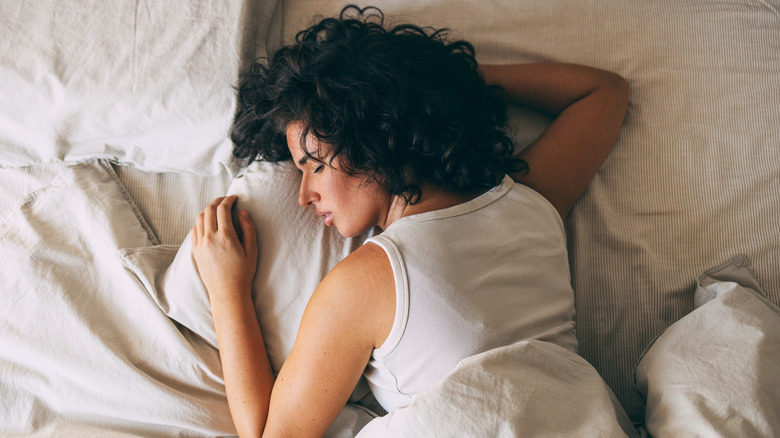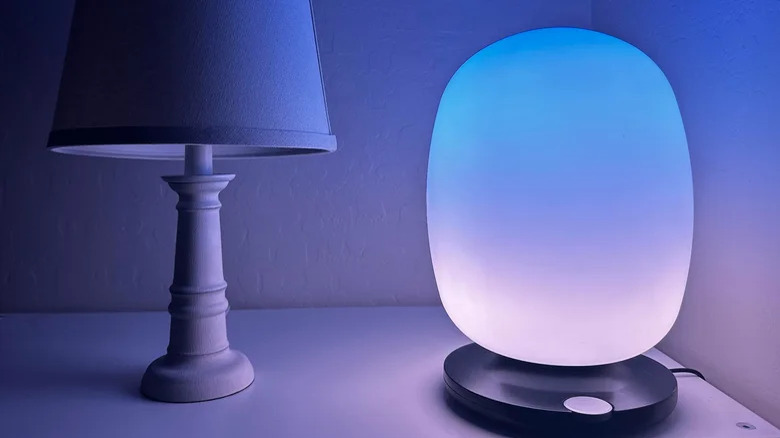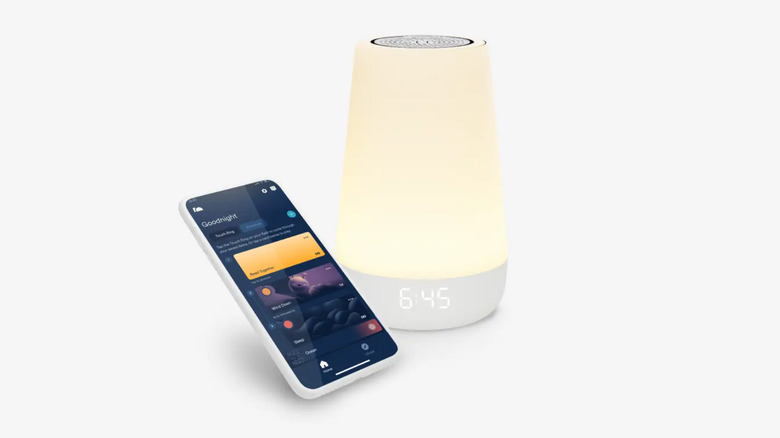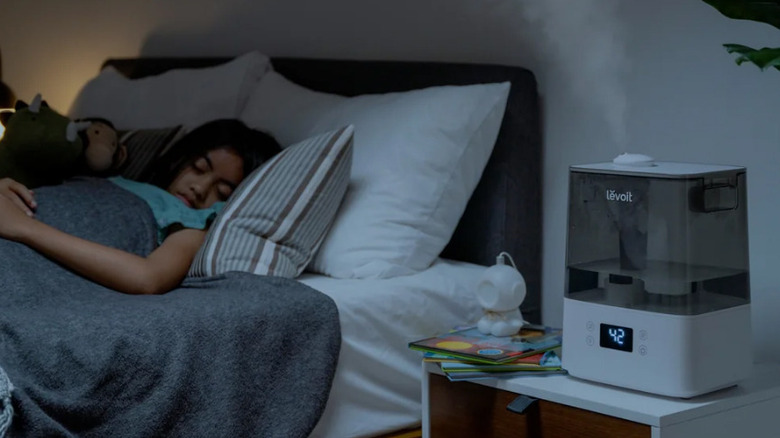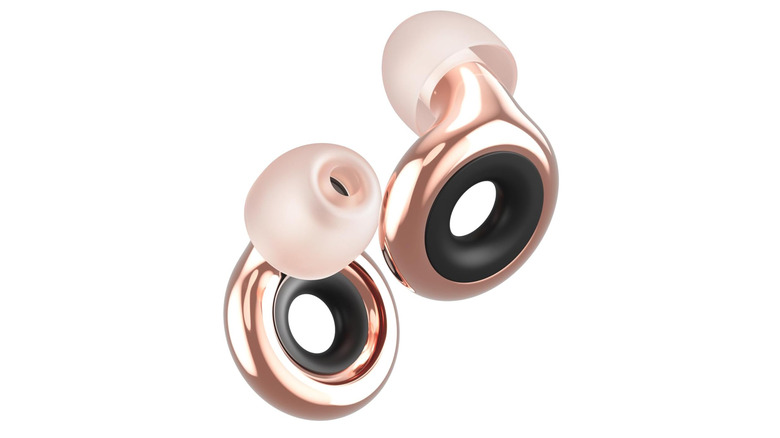I Tried 4 Gadgets That Claim To Help You Sleep Better: Here's Which Ones Worked
We may receive a commission on purchases made from links.
Sleep is one of those things that every single person on the planet needs on a daily basis. Unfortunately, some are not lucky enough to get the recommended seven to nine hours a night for one reason or another. This could be due to difficulties turning off their brains caused by things making them more alert than usual, such as bright lighting or using their phone before bed — or are addled with a myriad of sleep-related issues and disorders that are affecting their ability to fall and stay asleep.
In my case, for as long as I can remember, I've always been a super restless sleeper. It usually takes me around 30 minutes or more to get comfortable and drowsy enough to nod off, and it doesn't take a lot to jolt me back to wakefulness, whether it's a snoring dog, the A/C kicking on, or some faraway car alarm. I've often woken up tired and groggy, which is why I've decided to try a bunch of products and methods to attain better nighttime sleep.
Apart from getting a more comfortable pillow engineered for side sleeping and a quality weighted blanket that places a gentle hug-like pressure across the body — which can apparently reduce anxiety and promote production of relaxation and sleep-related hormones like serotonin and melatonin — below are some gadgets that I've had first-hand experience with and found to be quite effective in ensuring quality and restful sleep.
SkyView 2 lamp
I tested and reviewed the BIOS SkyView 2 lamp with such favorable results on my nighttime sleep. Marketed as a table lamp that mimics the range of light produced by the sun, you can set it up based on your geographical location so that it adjusts light levels all throughout the day. The lamp's lighting switches from a daytime sky-blue to a warm amber after the sun sets, which I've personally found to foster a more gradual decline of wakefulness by the time it's time to go to bed. I'm less tempted to scroll on my mobile phone and I found that it made me fall asleep a lot quicker, if my smartwatch sleep metrics are to be believed.
What I found to be the most game-changing feature in the SkyView 2 lamp was how well the sunrise feature worked in gently waking me up the next day. I used the lamp in place of my usual phone alarm, and I was able to gradually transition to full alertness without the usual annoyance and lethargy.
The only setback that I encountered in trying this lamp out to hack my sleep was that it was so effective, it also woke up my husband sleeping next to me. If you happen to sleep alone or are laying next to someone who likes waking up at relatively the same time as you, getting a smart lamp for the bedroom that matches your circadian rhythm may be a step in the right direction. Since my initial review, the SkyView 2 lamp has decreased in cost, but it's still quite an investment at $349 on Amazon.
Hatch Rest lamp
Another lamp that I found that helped me sleep better at night was something I didn't even purchase for myself. I first got the Rest lamp by a company called Hatch — the latest iteration is currently available at $60 on Amazon — when I gave birth to my eldest son back in 2016. It's a night light and sound machine in one that's designed to facilitate better and continuous sleep for babies. It also has a nifty time-to-rise feature to help older kids know when it's time to get out of bed when the light and sound change.
To date, my two kids, ages five and eight, still use the same lamp to sleep. The sound feature is a necessity at night because the soundscape we've picked for them effectively drowns out whatever ruckus is happening outside their door, like when we watch TV or host a gathering of our friends. In the morning, when the Rest lamp switches over to the green light (which they know means go) accompanied by the sound of birds chirping, they know it's time to get up from bed.
As a solid part of their bedtime routine, we've taken our Rest lamp with us whenever we travel as a family. Since we usually have to stay in the same room when we're on a trip, I've had to sleep with this lamp going in the background, and I've found that I do doze off quicker with the white noise.
Trying to sleep while listening to a sound machine may take some getting used to for a first-timer. Based on personal experience, once I got over the initial hump and landed on a couple of audio styles that I found sleep-inducing — hooray for rain and ocean sounds — the desire to zonk out hit me like clockwork.
Levoit smart humidifier
If you've ever tried to sleep in an environment that has dry air, unless you're used to it, you'd find that it's actually quite hard to get comfortable and stay that way throughout the night. Apart from the fact that low humidity can sometimes cause dry and itchy skin, it can also dry out your nasal and throat passages, making it a bit more difficult to breathe and more prone to snoring and nosebleeds.
When my family and I first moved to Las Vegas from Seattle, we got a couple of Levoit brand humidifiers — currently on sale on Amazon for $70 — to add some moisture to the air in our bedrooms. As a result, I've found that I actually had an easier time breathing at night, especially when I had a stuffy nose from a cold or experienced overall discomfort from the flu. It also doubled as a sound machine of sorts, effectively lulling me to sleep.
Although using a humidifier in dry climates or low humidity seasons could adequately improve your sleep quality in general, in some areas that have hard water, it can be a bit of a hassle. I've unfortunately had to stop using ours after a few months in favor of other sleep-aiding solutions because Las Vegas is one of the top cities that has the hardest water in the U.S.
Hard water has high levels of calcium that can accumulate inside the humidifier, so I had to clean the machine out regularly to make sure it doesn't clog and malfunction. Moreover, the calcium in the mist dispersed by the humidifier caused white dust to appear all over the walls and floor, which I also had to clean regularly to prevent it from settling on surfaces. If you live in a city with hard water, using a humidifier as a sleep tool may be a challenge.
Loop Experience 2 Plus Earplugs
I've tried all sorts of earplugs over the years and have generally found them to be uncomfortable and unreliable. Foam earplugs, while designed to expand to fit the shape of the ear canal, don't seem to stay put the entire night for me; I always wake up with them out of my ear. I was ready to rule out earplugs as a sleep enhancement solution until I heard about the company Loop through a targeted ad.
I actually chose an earlier iteration of the Loop Experience 2 Plus earplugs — available for $45 on Amazon — as something to wear to concerts and other live events. They were really effective for that purpose. I was able to hear the performers clearly despite being in a throng of screaming people. They were lifesavers during rock shows, where the decibels can reach ear-splitting levels.
When I got the idea to try wearing the Loop earplugs to sleep, I was pleasantly surprised by the outcome. They stayed secure the entire night, which was a win in itself. They were able to block out any low noise that normally woke me up in the middle of the night. More importantly, while it did stop most distractions from rousing me, it didn't bar me from hearing my phone alarm in the morning.
The Loop Experience 2 Plus earplugs come with a variety of ear tip sizes, including foam ones if you prefer them. You also get removable mute accessories that add a layer of protection in case you want to hear even less noise. Since buying my first pair, I've bought a second one to use exclusively for sleep, a pair for my husband who is sensitive to extremely loud sounds, and a pair for each of my kids to use in airplanes and during noisy outdoor events.
